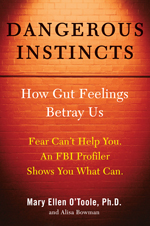Chapter 1
Would you date a rapist? Would you get into a drunk driver’s car? Would you ask a thief to invest your money? Would you allow your child to sleep over at a pedophile’s house? Would you let a serial killer into your home? Would you ignore behavior that warns that someone will likely shoot up a school, college classroom, or a workplace?
Most people answer all of those questions with a loud and confident “No!” I’m guessing you would as well. Like most people, you might as- sume that you would sense if someone were about to con or hurt you. Perhaps you think that you would get an “all is not right” sensation in your gut, heart, or somewhere else.
Unless you are highly unusual, however, you probably wouldn’t sense such danger at all. If more people could sense deceit or danger, a lot fewer people would become victims of violent crime, identity theft, pyramid schemes, and investment fraud.
When I talk with people about the unfortunate events that have taken place over their lives, I hear expressions like “It just came out of no- where,” “I never saw that one coming,” and “I can’t believe something like this could have happened to me.”
Such expressions are telling. They mean that these folks were not forewarned by any gut feelings at all. They did not sense fear. They did not sense deceit. They did not have a premonition of something bad about to happen.
Their instincts and intuition let them down. Have yours let you down too? Later in this book, we’ll walk through some of the decisions you’ve made in the past, and we’ll analyze them to see what type of an assessment process you used, how well it’s working for you, and whether it can be improved upon. Read more (PDF)
